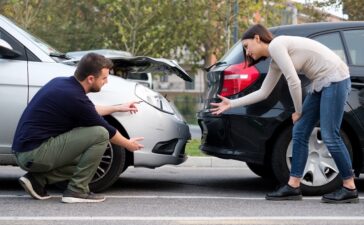You will probably have to claim with one or both parties’ insurers as a passenger. In case you have a personal medical expense benefits policy, you can file a claim for your medical bills.
It may seem that passenger claims are less complex than other forms of auto accident claims, but they’re not. Complicated responsibility and relationship issues can make it difficult to file an insurance claim or personal injury lawsuit.
The right Ohio injury attorney can help you file a personal injury claim and negotiate on your behalf, easing the reimbursement process.
Who Is at Fault for Personal Injury Claims?
A person is not entitled to compensation under a contributory negligence system if their conduct contributed in any way to the collision. A court judgment is based on contributory negligence. Insurance companies also consider it when valuing an accident claim.
In states that use a contributory negligence approach, identifying the at-fault driver in a vehicle accident lawsuit is critical. Traffic laws and safe driving are the responsibility of every motorist. To prove responsibility for an accident, a driver must prove negligence.
The following examples of careless behavior:
- DUI
- Overspeeding
- Ignoring traffic signs and signals
- Changing lanes in an unsafe manner
- Keeping too close to another vehicle
- Inappropriate driving for the weather and road conditions
- Failure to yield the right of way
- Driving while sleepy
- Driving while distracted
The driver is responsible for adhering to traffic laws, maintaining vehicle control, and avoiding distractions. After a collision, passengers usually file a claim with one or both drivers’ automobile insurance companies.
As a consequence of an uninsured driver who is at fault, passengers may be required to use their own uninsured motorist coverage. In rare instances, an injured passenger may be able to use their insurance policy.
When Is a Passenger Liable For an Accident?
Passengers, in general, are not responsible for accidents, even if they temporarily distract the driver. Drivers are accountable for their behavior. Be mindful of the road and avoid distractions while driving.
Exceptions are possible. A passenger who tries to take control of the vehicle by grabbing the steering wheel may be held responsible for the accident. It is rare for a passenger to be blamed for an accident. Remind the driver to keep their attention on the road. Avoid distracting the driver at all costs.





